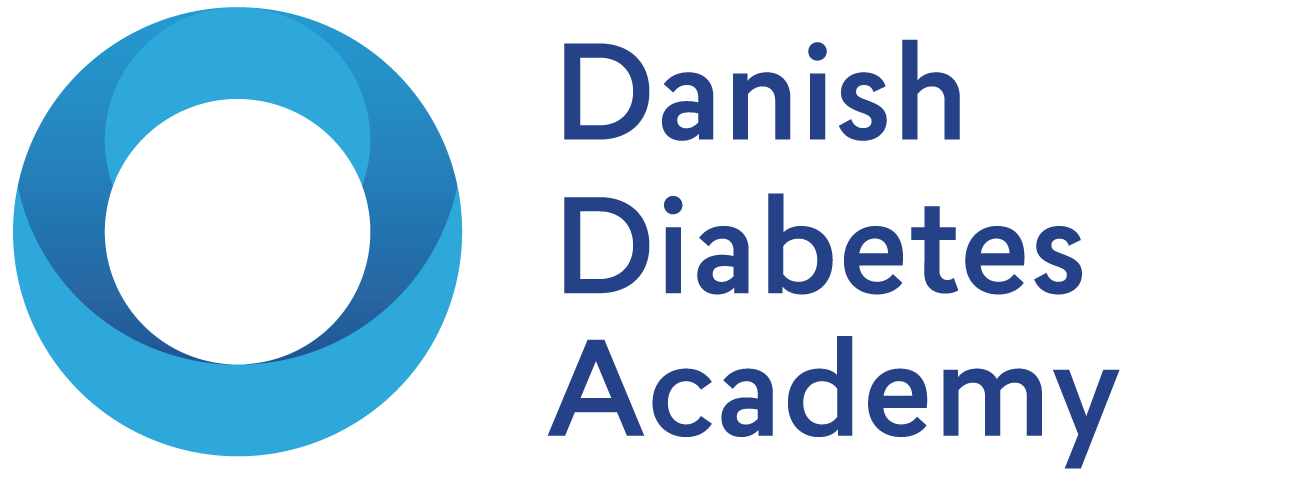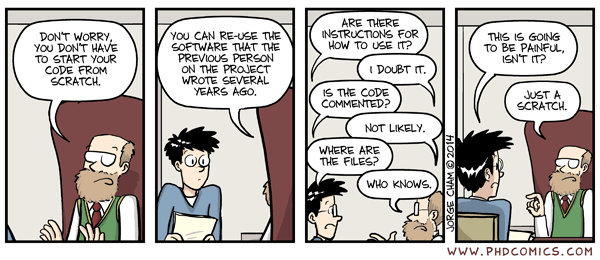Introduction to the course
Reproducibilty and open science
Luke Johnston


Outline
- What is reproducibility
- What is open science
- Open access
- Open data
- Open source (code)
- What is R and why learn it
- Course introduction
- What it is (and isn't)
- Layout and website
- Expected learning outcome
- Code of Conduct


Question:
How many know or have heard or know about reproducibility?


Question:
How many know or have heard or know about open science?


Question:
...or even open access, open data, or open source?


How many have read a method in a paper and wondered how they actually did it?
Because you are trying to do the same or similar?


Has anyone ever received confusing code? Or maybe have written your own confusing code?

Source: PhD Comics


These issues can be fixed by creating and nurturing a culture of openness


Code sharing: From scientific principle of "reproducibility"
... often confused with "replicability" [2]1


Code sharing: From scientific principle of "reproducibility"
... often confused with "replicability" [2]1
Replicability
- Repeating a study by independently performing another identical study
- Difficult, usually needs funding
- Linked to the "irreproducibility crisis"2 (covered later)


Code sharing: From scientific principle of "reproducibility"
... often confused with "replicability" [2]1
Replicability
- Repeating a study by independently performing another identical study
- Difficult, usually needs funding
- Linked to the "irreproducibility crisis"2 (covered later)
Reproducibility
- Generating the exact same results when using the same data and code
- Should be easy right? Wrong, often just as hard
- Question: If we can't even reproduce a studies results, how can we expect to replicate it?
- Also from a American Statistical Association statement.
- Or rather "irreplicability crisis".


Biomedical studies almost entirely don't publish code with the published paper
- Example: In epidemiology, of 90 articles reviewed [5]:
- 43 (48%) did not report how data was processed
- 21 (24%) did not report how analysis was conducted
- 0 made code available in any way


Biomedical studies almost entirely don't publish code with the published paper
- Example: In epidemiology, of 90 articles reviewed [5]:
- 43 (48%) did not report how data was processed
- 21 (24%) did not report how analysis was conducted
- 0 made code available in any way
- Why? Likely due to:
- Lack of awareness and training
- Difficulty of adoption
- No incentive or reward
- Little to no culture to do it


Open science: Terms and meanings
| Term | Meaning |
|---|---|
| Open science | Freely available, openly licensed * material for all things related to scientific activity |
| Open access | Free, unrestricted, publicly available published articles |
| Open data | Freely available, re-usable, openly licensed data |
| Open source/code | Freely available, re-usable, openly licensed scientific code used in generating results |
* We'll cover licenses later.


Goal of this course? Start changing the culture by providing the training.


Course website and layout:
- True to our mission, material publicly accessible and openly licensed
- Course is mix of "code-alongs" and lectures
- Interspersed with hands-on exercises
- Combined with final group-work assignment (more on this later)


Course website and layout:
- True to our mission, material publicly accessible and openly licensed
- Course is mix of "code-alongs" and lectures
- Interspersed with hands-on exercises
- Combined with final group-work assignment (more on this later)
What we aim to teach (and you learn)
- Recognize importance of reproducibility and open science
- Know and be aware of (some of) the modern tools to use
- Know a general workflow for doing analyses
- Know in general how to navigate and code in R
- How to generally think about data


Course website and layout:
- True to our mission, material publicly accessible and openly licensed
- Course is mix of "code-alongs" and lectures
- Interspersed with hands-on exercises
- Combined with final group-work assignment (more on this later)
What we aim to teach (and you learn)
- Recognize importance of reproducibility and open science
- Know and be aware of (some of) the modern tools to use
- Know a general workflow for doing analyses
- Know in general how to navigate and code in R
- How to generally think about data
What you won't learn
- No (or minimal) statistics or modelling
- No writing skills
- No study or experimental design
- No spreadsheet or large databases (e.g. SQL)


Other considerations
- We have a Code of Conduct
- Asking for help is as easy as using a sticky on your laptop
- We have lots of helpers!
- We're all learning here, this is a supportive and safe environment


Other considerations
- We have a Code of Conduct
- Asking for help is as easy as using a sticky on your laptop
- We have lots of helpers!
- We're all learning here, this is a supportive and safe environment
Resources and further reading
- Best practices see [6; 7]
- Case studies and lessons for doing reproducibility
- Case study in Bioinformatics see [1]


References 1
[1] Y. Kim, J. Poline, et al. "Experimenting with Reproducibility: A Case Study of Robustness in Bioinformatics". In: GigaScience 7.7 (Jun. 2018). DOI: 10.1093/gigascience/giy077.
[2] H. E. Plesser. "Reproducibility Vs. Replicability: A Brief History of a Confused Terminology". In: Frontiers in Neuroinformatics 11 (Jan. 2018). DOI: 10.3389/fninf.2017.00076.
[3] J. T. Leek and L. R. Jager. "Is Most Published Research Really False?" In: Annual Review of Statistics and Its Application 4.1 (Mar. 2017), pp. 109-122. DOI: 10.1146/annurev-statistics-060116-054104.
[4] E. C. Considine, G. Thomas, et al. "Critical Review of Reporting of the Data Analysis Step in Metabolomics". In: Metabolomics 14.1 (Dec. 2017). DOI: 10.1007/s11306-017-1299-3.
[5] R. D. Peng, F. Dominici, et al. "Reproducible Epidemiologic Research". In: American Journal of Epidemiology 163.9 (Mar. 2006), pp. 783-789. DOI: 10.1093/aje/kwj093.
[6] G. Wilson, D. A. Aruliah, et al. "Best Practices for Scientific Computing". In: PLoS Biology 12.1 (Jan. 2014). Ed. by J. A. Eisen, p. e1001745. DOI: 10.1371/journal.pbio.1001745.
[7] S. Eglen, B. Marwick, et al. "Towards Standard Practices for Sharing Computer Code and Programs in Neuroscience". In: bioRxiv (Mar. 2016). DOI: 10.1101/045104.